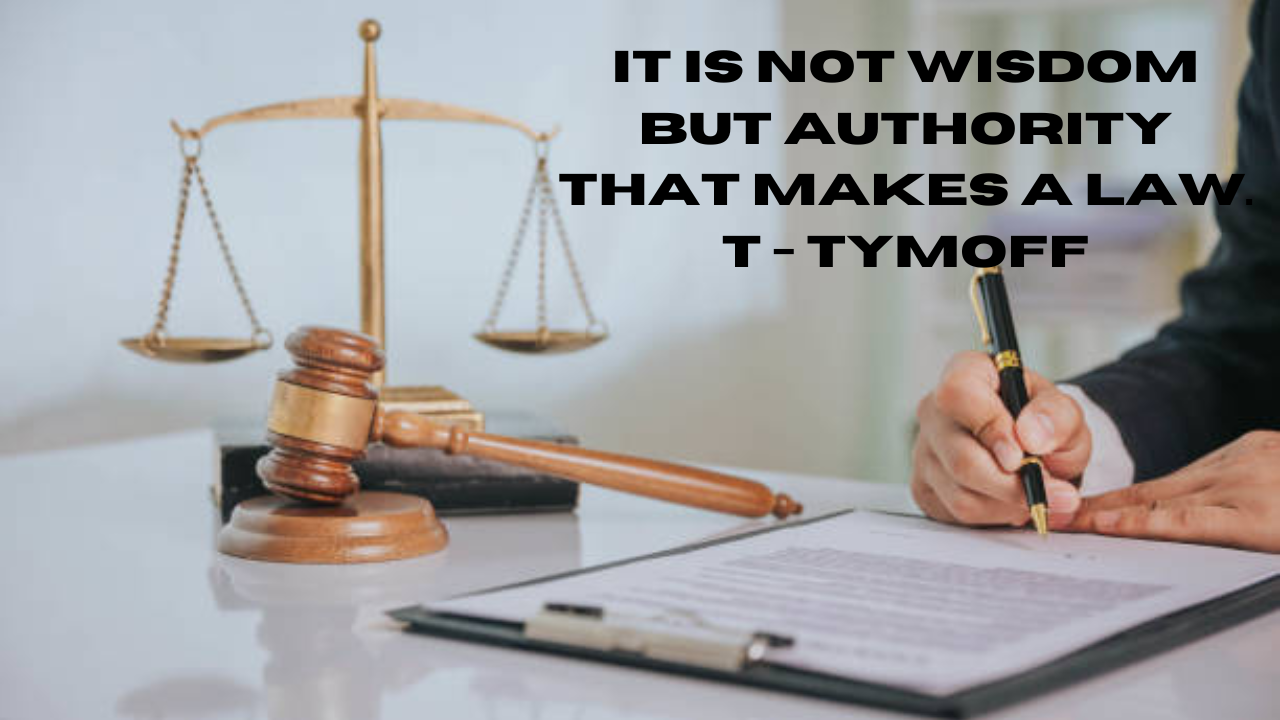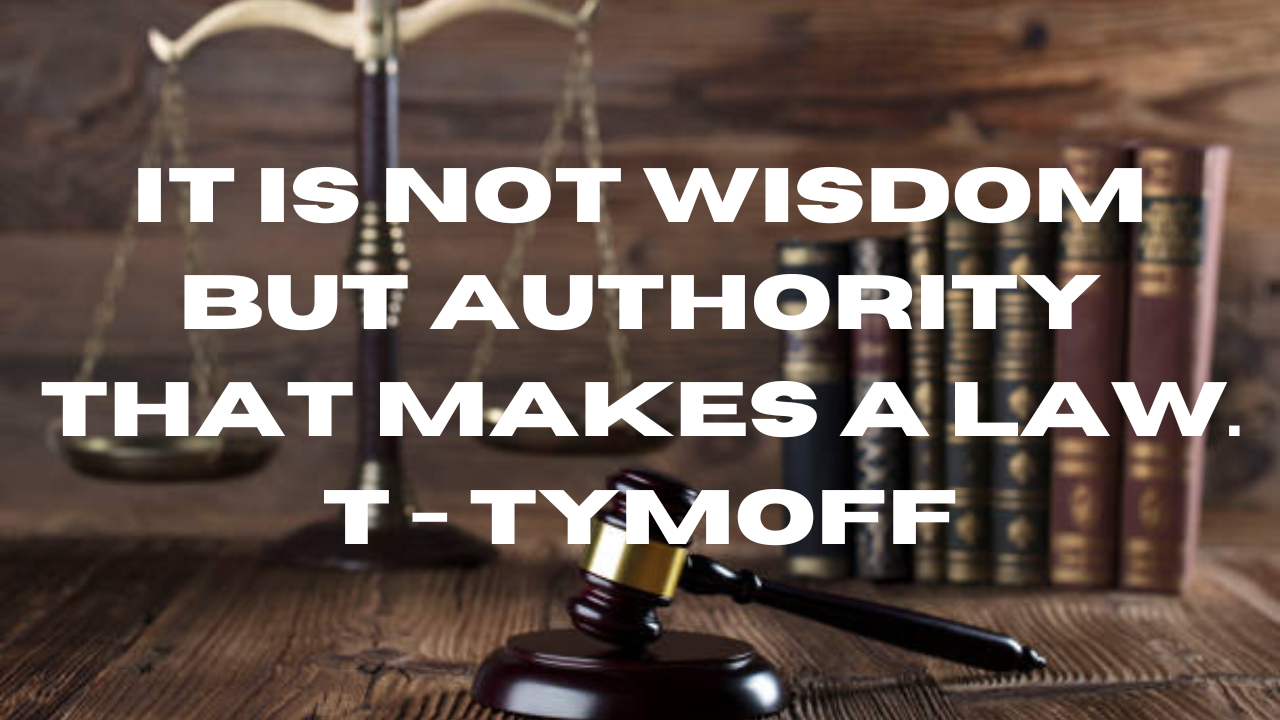Laws have been a cornerstone of civilization, guiding societies and ensuring order for centuries. The quote, “it is not wisdom but authority that makes a law. T – Tymoff, “ is a profound statement on power, justice, and governance dynamics. This idea challenges the romantic notion that laws are always rooted in fairness and intellectual insight. Instead, it points to the reality that laws are often shaped and enforced by those in positions of authority, regardless of their moral or scholarly merit. This raises critical questions about legal frameworks’ origins, intent, and implications.
What Is Authority in Lawmaking?
Authority is the recognized power to make decisions, enforce laws, and regulate societal conduct. It stems from political institutions, governments, or ruling entities, and this authority—not wisdom—has the ultimate say in creating laws. Authority carries the weight of enforcement, which ensures compliance regardless of whether the law aligns with ethical or rational principles. This concept reminds us that the legitimacy of a law does not necessarily stem from its moral or intellectual foundation but from the power behind it.
The Disconnection Between Wisdom and Authority
Wisdom is the ability to discern what is true, correct, or lasting. Laws should be products of wise deliberation, incorporating justice and ethical considerations. However, history shows that laws are often made to serve the interests of those in power rather than the collective good. For example, authoritarian regimes have enacted laws that perpetuate oppression and inequality. These laws, while authoritative, lack the wisdom to foster equity and progress.
The quote, “it is not wisdom but authority that makes a law. T – Tymoff”, underscores the frequent disconnect between what is just and what is enforced. This disconnection can lead to unjust systems where laws benefit a few while marginalizing others.

Historical Contexts Highlighting Authority Over Wisdom
History offers numerous examples where authority, not wisdom, dictated the creation of laws:
Colonial Laws: Colonizing powers imposed laws that prioritized exploitation over the well-being of native populations. These laws were authoritative but lacked moral grounding.
Jim Crow Laws: In the United States, these laws enforced racial segregation and discrimination. While legally binding, they lacked ethical or wise principles, ultimately causing profound societal harm.
Authoritarian Regimes: Many dictatorships have used legal systems to suppress dissent and control populations. These laws serve as tools of authority rather than wisdom, illustrating the dangerous potential of unchecked power.
The Role of Justice in Lawmaking
While authority establishes laws, justice ensures they are fair, equitable, and beneficial. Justice is the moral compass that should guide the use of authority in lawmaking. However, achieving justice requires accountability and the inclusion of diverse perspectives. Without these safeguards, authority can produce laws that perpetuate systemic inequities.
The balance between authority and wisdom is crucial. Laws must be enforceable, but they must also reflect ethical and just principles. When authority disregards wisdom, society is often burdened by unfair systems and discontented citizens.
The Importance of Civic Engagement
Civic engagement plays a pivotal role in aligning authority with wisdom. Citizens must actively participate in the democratic process, challenging laws that lack justice and advocating for policies that promote fairness. By doing so, societies can push for legal frameworks prioritizing enforceability and ethical integrity.
Another critical step is educating the public about their rights and the legislative process. An informed populace can question authority and demand accountability, ensuring that laws serve the common good rather than the interests of a select few.
Modern Implications of the Quote
In contemporary society, the quote “it is not wisdom but authority that makes a law. T – Tymoff” continues to resonate. It reminds us to scrutinize the origins and intents of laws, particularly in an era of increasing authoritarian tendencies and political polarization. The ongoing debates about surveillance, environmental regulations, and social justice highlight the tension between authority-driven laws and the pursuit of wisdom-based governance.
For example, environmental laws influenced by corporate lobbying often prioritize short-term economic gains over long-term ecological sustainability. These laws showcase the dominance of authority but neglect the wisdom needed to address climate change effectively. Similarly, laws targeting marginalized communities under the guise of security or public order can undermine human rights, reflecting authority without justice.

Fainl Reviews
The quote “it is not wisdom but authority that makes a law. T – Tymoff” invites deep reflection on the nature of lawmaking and governance. While authority ensures the creation and enforcement of laws, wisdom, and justice are essential for their legitimacy and effectiveness. A society that values enforceability and ethical considerations can create laws that serve its people.
As citizens, it is our responsibility to demand accountability from those in power and advocate for laws that reflect wisdom, fairness, and justice. Only by bridging the gap between authority and wisdom can we hope to build a legal system that upholds the principles of equity and morality. In this pursuit, this quote serves as both a warning and a call to action.



